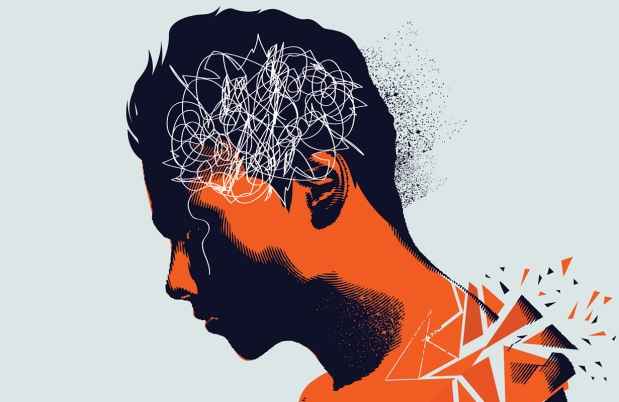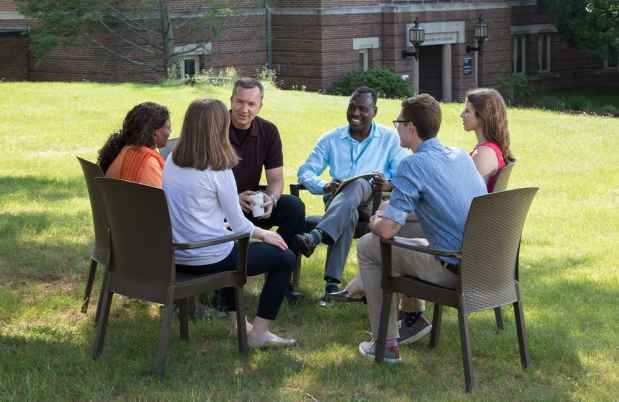Late in her medical residency, Amanda Sedgewick, DO, was running treatment groups for women with substance use disorders. Patients would disappear from treatment for weeks at a time and Sedgewick realized they were in abusive relationships—which was keeping them away from the clinic.
So, she began addressing the abuse—enlisting the assistance of a domestic violence shelter, police, and free legal services.
“I started noticing women became more engaged when we talked about domestic violence and other barriers to treatment—and group retention improved,” she said.
The intersection of intimate partner violence (IPV) and substance use disorder would become Sedgewick’s life’s work.
A psychiatrist with McLean’s Division of Alcohol, Drugs, and Addiction (DADA) and the Division of Women’s Mental Health (DWMH), she is one of the researchers doing pioneering work in women’s mental health, thanks to the philanthropic support of McLean donors like Marilyn and Jay Sarles.
The Sarles Young Investigator Award for Research on Women and Addiction is an annual award overseen by both the DWMH and DADA and has been instrumental for clinicians like Sedgewick.
The award helped her develop an 8-session pilot group intervention, Recovering Safety, for women with substance use disorders who are survivors of IPV. She also evaluated the efficacy of the treatment and created a manual for the group as a Sarles fellow.
“Women really like the group,” said Sedgewick. “They feel more empowered and are able to deal more effectively with problems caused by intimate partner violence.”
Mental health care designed for the unique needs of women and girls is a relatively new approach, and McLean is a recognized pioneer in this young field.
Prior to the 1990s, there was no mandate that women be included in federally funded medical or psychiatric clinical trials. Despite clear biological differences and distinct needs, more than half of the population was often excluded from research until quite recently.

Another Sarles Award recipient, Dawn Sugarman, PhD, has developed a gender-responsive web-based intervention for women with substance use disorders that could augment treatment as usual in mixed-gender programs.
Content for her intervention was adapted from the Women’s Recovery Group (WRG), an innovative, evidence-based group therapy for women with substance use disorders developed by Dr. Shelly Greenfield.
The WRG is a nationally recognized standard of care for treating women with substance use disorders. Most substance use treatment is mixed gender, but the WRG recognizes the unique challenges that women with alcohol and drug use disorders face.
The goal of adapting it to a digital platform is to increase women’s access to this evidence-based treatment.
Under the innovative leadership of Drs. Greenfield and Amy Gagliardi—division chief and clinical director respectively of McLean’s DWMH—the hospital is leading the charge to understand, address, create visibility, and raise awareness about the unique behavioral and mental health needs of women and girls, something long overlooked.
To treat women more effectively, these gender differences must be accounted for—biologically, genetically, and socially.
“Training researchers and clinicians to recognize and understand the many differences between the way men and women experience mental illness is absolutely paramount to good care for women and girls,” said Greenfield.
Along with the Sarles Award, Sedgewick was also the recipient of McLean’s highly competitive Women’s Mental Health Psychiatry Fellowship—a year-long, philanthropically-funded training program consisting of clinical rotations in multiple programs within McLean’s DWMH.
In addition to rotating through numerous inpatient and residential units at McLean, Sedgewick also spent time at Brigham and Women’s Hospital treating women during pregnancy and postpartum.
The Women’s Mental Health Fellowship is in its seventh year and, according to Gagliardi, it is the only training program of its kind in the country.
“There are other fellowships with a women’s mental health focus, but nearly every one of them concentrates on perinatal psychiatry exclusively,” she explained.
“That is an important, but very small, slice of women’s mental health. Our program is comprehensive, unique, and critically important for clinicians and researchers who want to focus on the disorders that disproportionately affect women and girls across the lifespan.”
Five of the six fellows who have completed their training have continued at McLean to advance their work, and every one of them has shared that the experience was a game-changer for their careers and deepened their understanding of the way women and girls experience psychiatric illnesses.
Sedgewick said the comprehensive nature of the fellowship was critical.
“Women may have addiction, complex trauma, an eating disorder, or borderline personality disorder, and after training with expert clinicians at McLean, I’m able to treat all of these issues more effectively.”
During her fellowship year, Sedgewick became well-versed in Greenfield’s WRG.
“Women have told me they’ve shared things they never would have felt comfortable sharing in a mixed gender group,” she said. “Especially women who have experienced gender-based violence.”
Now, the fellows are building on one another’s work in unique ways. For example, Sedgewick trained subsequent fellows in delivering Recovering Safety, and now women at McLean who are recovering from substance use and have been affected by IPV can access this unique treatment.
“We launched the division in 2014, and I am so proud of what we have accomplished thus far,” said Greenfield.
“We are training clinicians and researchers in ways that no one else is doing. And I am certain that this will change the trajectory of mental health care for women and girls for generations to come. We would not be where we are today without the generous and forward-thinking philanthropy of McLean’s donors.”
McLean Women’s Mental Health Fellows
The Women’s Mental Health Fellowship helps McLean attract and train the best and brightest talent, while advancing the field. Since the fellowship’s inception in 2017, the division has hosted six fellows who have completed their training, five of whom are now in staff positions at McLean:
- 2017-2018 Anne Blythe Rose, MD, MPH, is an attending psychiatrist in McLean’s Pavilion program.
- 2018-2019 Amanda Sedgewick, DO, serves as psychiatrist- in-charge on McLean’s Alcohol, Drugs, and Addiction Inpatient Program and leads outpatient groups for women with intimate partner violence and substance use disorders.
- 2019-2020 Ashley Beaulieu, DO, spent two years in the Dissociative Disorders and Trauma Inpatient Program and now serves on an inpatient team treating depression and anxiety.
- 2020-2021 Kayia Akoun, MD, works on our Dissociative Disorders and Trauma Inpatient Program and in McLean’s College Mental Health Program.
- 2021-2022 Ranjani Logaraj, MD, is an attending psychiatrist on McLean’s Short Term Unit. She continues to co-lead the outpatient Women’s Recovery Group and has a role in medical student teaching.
- 2022- 2023 Raphaela “Raphi” Gold, MD, MSc, will move on from McLean and share her expertise internationally in a faculty role at the University of Ottawa.
- 2023-2024 Chloe Sharp, MD, began her fellowship at McLean on July 1, 2023.
- 2024-2025 Nikki Haddad, MD, will join the McLean team on July 1, 2024.
We are deeply grateful to the many donors who have contributed to these unique and impactful training opportunities. To learn more about supporting these initiatives, please contact Claudia Haydon.
Media Requests
Journalist or member of the media? We are available 24/7 for media requests.



